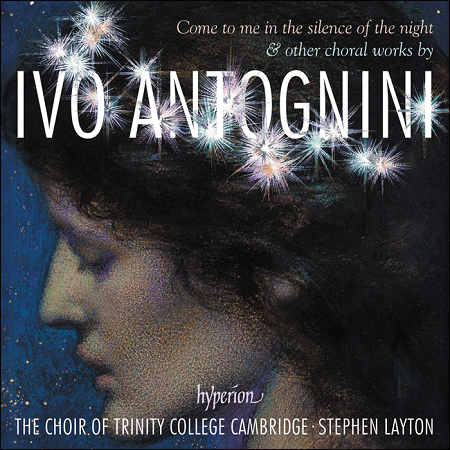On this disc of a cappella choral music by the Swiss-born Ivo Antognini (born 1962), issued earlier this year by Hyperion, the Choir of Trinity College, Cambridge yet again demonstrate a wonderfully plush tone quality. If unfamiliar to UK listeners, Antognini is an established composer, and after studies in Lucerne and Bern where he began composing for television, film and jazz, he has since devoted his energies to choral works initially inspired by hearing the Swiss children’s choir Coro Calicantus. His works have now been performed throughout Europe and the USA, and several have won international awards.
First impressions will leave you in no doubt of Antognini’s sumptuous harmonies, built on added note or cluster chords which find their origin in his early jazz pieces. Then there’s the ease with which he shapes these works with a natural sense of progression marked by a seemingly effortless flow of upper-line melody and gratifying harmonies that either sooth or sedate the ear, the latter if you intend to listen to the disc at one hearing. There’s also an innate sensitivity to the words, but the individual works, whether setting sacred or secular texts, are often indistinguishable from one another. His transatlantic style, somewhere between Eric Whitacre and Will Todd, breaks down into two clearly defined types: slow to medium tempo with lush, sugar-coated harmonies that might make you re-think your dental health plan, and invigorating, playful pieces that might wrong-foot your sense of metre. In short, Antognini offers a set menu, and you can have either extrovert or indulgent.

Amongst the few faster pieces, I much enjoyed his jazz-infused and admirably crafted Jubilate Deo, its dancing rhythms sung with great gusto by these 30-plus Trinity voices where their technical skill is lightly worn. Intonation is impeccable and rhythms tightly controlled. In a similar unbuttoned vein is Antognini’s high energy Gloria which alternates urgent pulsing rhythms with slower passages of upholstered harmonies. If he doesn’t always know when to stop, that’s well illustrated in Canticum novum, another glitzy number that feels overcooked.
Of the pieces that can be described as ‘smooth classics’ (and surely it won’t be long before these works are heard regularly on Classic FM), the poignant Come to me is a winner. Gorgeous, tender harmonies capture a grieving lover or partner yearning for their beloved to return to them in their dreams. It’s a marvellously sympathetic marriage of words (Christina Rossetti) and music, beautifully sung, if too obviously electronically enhanced so the bass line is given a more solid foundation than might otherwise be expected of young voices. In a similar sweet-toothed vein are Remembrance (a setting of Percy Bysshe Shelley) and Surge amica mea (from the Song of Songs), but it’s not too long before one feels Antognini has exhausted his template of gooey harmonies, no matter how skilfully they are fashioned. Hope is the thing with feathers is somewhat earthbound and never quite floats with the simplicity or serenity suggested by Emily Dickinson’s poetry.
I did enjoy the Trinity Service, a settingmaking a welcome addition to the liturgical repertoire of contemporary evening canticles. The use of word painting is nicely achieved with some harmonic frisson at ‘magnified me’, ‘exalted’ and ‘Abraham and his seed for ever’. It’s a score laden with expressive markings (‘majestic’, ‘with vigour’, intense’, ‘with affection’), but how much difference that makes to a choir of this calibre is uncertain. Needless to say, the ‘Magnificat’ is sung with the choir’s customary warmth and intensity. The ‘Nunc dimittis’ is no less involving, its pathos given lustre by soprano soloist Sumei Bao-Smith.
Overall, the voices Stephen Layton has at his disposal sing with outstanding attention to detail and expression, phrases perfectly moulded with words consistently invested in meaning. Antognini is clearly a fine composer, but one can sometimes only have so much of his music.
David Truslove
Come to me, Canticum novum, O magnum mysterium, Lux aeterna, Regina caeli, Hope is the thing with feathers, Surge amica mea, Gloria in excelsis, Trinity Service, Remembrance, Laudate Dominum, Alleluia, Those tender words, Jubilate Deo, The Angel
The Choir of Trinity College, Cambridge, Stephen Layton (conductor)
Hyperion CDA 68425 [65.54]